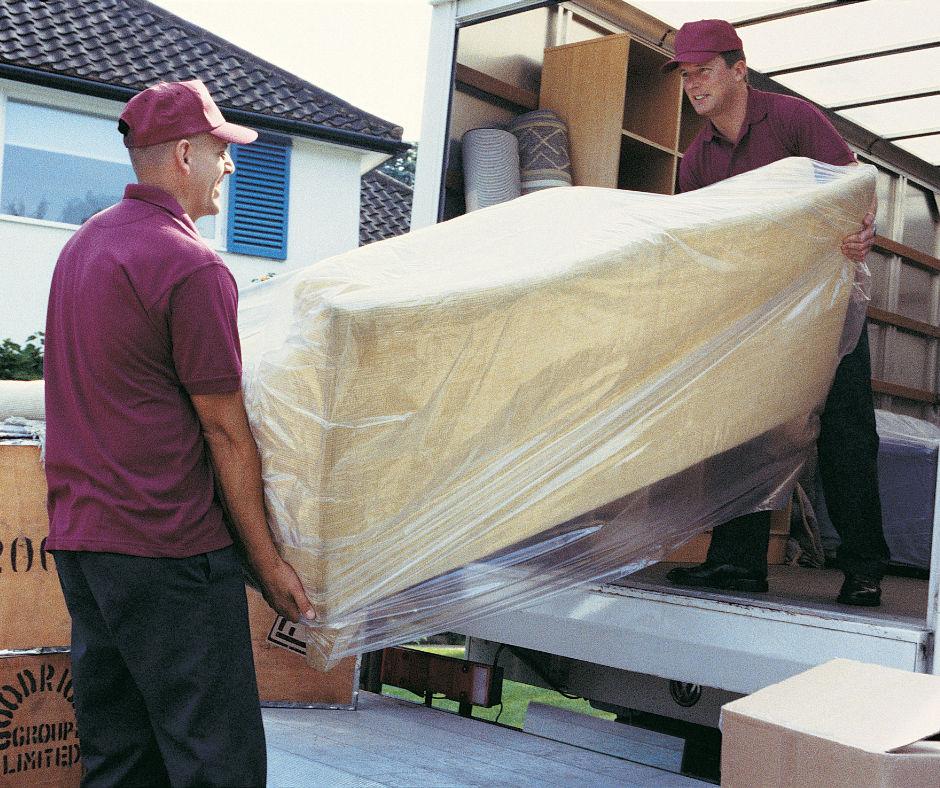15 Packing Tips For a Long-Distance Move
However, a lot of these moves will be long-distance. They could be moving to the next state over or even further across the country, which can create a potentially more stressful situation than a short move!
To minimize the stress of a long-distance move, you should consider your packing strategy. Getting all of your belongings safely packed up and to their destination is one of the best ways to ensure everything goes smoothly.
Here are some packing tips to bear in mind when preparing for your move.
1. Categorize Items
The first thing you'll want to do is categorize your items. The last thing you want to do is have the state-to-state movers arrive at your new location, unload your boxes, and find you don't actually know where the plates are.
Don't pack things haphazardly in boxes that aren't related to each other.
Instead, try to pack by room — that is, the rooms at your new location. That way, when you arrive, you can place the boxes in each room which will make unpacking at the other end feel like a less intimidating prospect.
It also means you can prioritize. Chances are, you won't be able to unpack everything on the first night — you'll be way too tired, and the process is likely to span days in the future. You can unpack a couple of boxes at a time depending on what you need.
For example, bathroom essentials are likely way more important than whatever's going in the game room!
2. Label Each Box Clearly
In the same vein, you should make sure that each box is labeled clearly.
You can scribble a room on the box if you like. If you want to be very efficient, you can go one step further and attach a checklist to each box. That way, you can see every individual item in the box and rummage through if you need it urgently at your location.
Labeling the boxes also makes it much easier for out-of-state moving companies to deal with them. They'll be able to see which boxes are fragile and know that they should be very careful with them.
They'll also know which boxes are heavier, which is handy to know when lifting them. If the long-distance moving companies are the ones packing the truck, it also helps them to know which boxes should go at the bottom and which should go on top.
Heavier, non-fragile boxes at the bottom!
3. Use All Available Space
When it comes to the boxes, it's essential to use all of the available space inside.
This doesn't mean packing a bunch of heavy, unrelated items together. What it does mean is trying to be tactically smug and filling the spaces with padding and packing paper.
If items are rattling around in a box, it makes the box itself less stable, and it's much more likely something will get broken. Packing things tightly means there's no room for them to move around and bang off things.
This is particularly dangerous with a long-distance move, because your items have a long way to go and there's much more of an opportunity for them to get broken.
4. Keep Important Documents With You
In no way should you ever pack your important documents in the boxes. You might have looked at the best cheap moving companies and think you've found the most reliable, but there's always a chance for something to go wrong that's completely out of their control.
Hopefully, the worst won't happen, but you should be prepared if it does. Make sure you have important documents with you.
These include:
- Birth certificates
- Marriage certificates
- Financial documents
- School records for children
- Health records
- Vet records for pets
Ultimately though, which documents are important will depend on each individual family. It's handy to make a list of them, especially if it's something you can't get digital copies of and reprint — such as a birth or marriage certificate.
Make sure they're protected in a plastic folder and keep them on your person, if possible. If you're driving, you can keep them in the car and if you're flying, you can keep them in your carry-on case.
5. Pack an Emergency Kit
Another thing you should do is pack an emergency kit to keep with you at all times. Even the journey is only a couple of hours on a plane, or the drive doesn't seem too long, you never know what could happen.
You could be delayed while your belongings are already on their way to your destination. You could arrive at your destination only to find out that your belongings are delayed.
In that case, you'll need enough belongings with you to survive for a day or two.
Make sure you have:
- Any medication you or a member of your family needs
- Batteries, just in case
- A portable phone charger
- The important documents
- Your wallet with your cards and ID
- Refillable water bottles
- Snacks, such as protein bars
- A tablet or portable game console to keep the kids amused
- Anything your pets might need such as a water bowl, some food, a travel crate, etc.
If you keep a bag or small suitcase stocked with these things, you might find you're extremely grateful to your past self for thinking of this! The best moving and travel companies will work hard to keep you from being delayed, but some things are completely outside of their control.
6. Stock Up on Packing Supplies
Before you even begin to pack, buy more packing supplies. More than you think you need!
Packing supplies are fairly cheap from retailers like Amazon, and you can even source some from friends who've moved and have some left over. Ask on social media if anyone has any, and hoard it like a dragon.
The reason for this is that it's always better to have too much than too little. When you get into a groove with packing and you're working hard, the last thing you want is to look up and see that you've run out of supplies. You'll have to break your stride to run to the store, or worse, order some online and wait a few days for them to arrive.
This can take up a lot of time, and time is precious when moving.
If you ensure you have far more packing supplies than you think you need, then you know you won't run out in the middle of what you're doing. If you have some left over at the end, you can always donate it to a friend or family member who's about to move in the near future.
7. Break Down Large Items
If you have furniture and large machinery or appliances, don't try to pack them as they are. Break them down if possible.
Sofas and a lot of furniture can be broken down into pieces and put in boxes. This means you can spread them out over boxes to make them lighter, but it also means that you're taking up less space and can play a more efficient and successful game of Tetris when packing the boxes themselves.
Large items may also not fit into boxes at all. This can be an issue, because loading things directly onto a truck can increase the risk of damage and scratches.
Some things may simply be too big for this. In that case, you should cover them with plastic wrap or something else that keeps them protected from being bashed around inside of the truck. However, where possible, break them down into smaller components and get them into boxes.
8. Use Plastic Over Cardboard
Cardboard boxes are a cheap and easy option when it comes to packing for a move. You can usually get them for cheap or you may be able to find some for free from retailers who leave their old boxes out at the end of the day. Either way, they're inexpensive!
However, if you have the budget or have some lying around, plastic over cardboard is a great idea for a long-distance move.
Cardboard is more susceptible to damage. Not only can cardboard tear more easily, but insects can also chew through cardboard.
They also might be exposed to the elements. If plastic gets wet, that water will slide right off.
If cardboard gets weight, you're looking at everything inside being damaged.
If you only have a few plastic bins and are wondering what to prioritize storing in them, electronics are the best way to go. They're the things that will get damaged most if exposed to the elements.
9. Keep Boxes Light
Although it's important to pack things snugly, you should also try to keep boxes light — especially if you are using cardboard.
The reason for this is that boxes break. Even if you tape up your boxes tightly and use a whole roll of tape on each one, if the contents are too heavy, the boxes will simply break.
This is where you need to be strategic and balance your organization with your sensibilities. You might want to pack all of those heavy electronics in one box for the sake of organization and using fewer boxes, but it's better to spread them out over a few and stuff them with packing materials to ensure the space is still snug.
When moving, there's nothing worse than picking up a box and having things tumble out of it. This will be even worse if it happens when the movers are picking things up and you aren't around. They don't know how things were packed, what goes where, or how to tell if things are broken, and it might end up making things worse.
If you can't lift a box on your own, it's likely too heavy for cardboard.
10. Get Insurance
Many people don't realize that their homeowners' insurance doesn't cover possessions while moving. That's why it's important to get insurance that specifically protects against your possessions while they're en route to your new home and under the care of movers.
Even if you've taken all of the best packing tips on board and picked movers who excel at long-distance moves, there's still a chance that external factors could damage your possessions.
There could be a traffic accident or your movers could run into weather that unfortunately harms your belongings.
In this case, the insurance company will pay for the damage.
You will, however, have to prove that the items were damaged while on the move and not while at home. To make sure you have everything you need when filing a claim, consider having a comprehensive inventory list of everything you're moving. It also helps to take before and after pictures of your property.
Take a picture of the inside of each box before you close it up, making sure that every item is visible. Hopefully, you'll never need to take pictures at the end of the journey, but if you do, you have the pictures from the start proving there's a difference.
Just be sure to pick an insurance company that has:
- An understandable and clear policy
- Good reviews and a history of paying out claims
- A good price in comparison to other insurance companies
Sometimes, an insurance company you're already with will also do moving insurance, which is a great bet if you've already had a good experience with them. Look at the companies who insure your home, car, etc. to see if this is something they offer.

11. Ask for Help
45% of Americans find moving to be the most stressful life event — more than marriage and divorce, and more than having kids! That's quite a number of people who dread moving.
That's why it's important to ask for help, especially if you're on your own. There's so much that can go wrong with moving, and the last thing you want to do is be on your own to deal with the fallout. Besides, if you're packing for a move on your own, there's already more that can go wrong anyway because you don't have a second set of eyes on things.
Make sure you ask for help. Ask for packing help, ask for someone to watch the kids, ask for a ride to the airport — whatever it is you need!
The great thing about doing this is that you can return the favor whenever your friends need it to. Offer them beer, pizza, or whatever their drink and food of choice are in return for helping. Most good friends will be happy to help.
12. Move Pets and Kids Out of the Way
One of the best packing tips is to move your kids and pets out of the way.
Kids need constant entertainment and may get in the way. Find a friend or family member that can watch them, or take turns with your spouse while the other does some packing.
If your kids are old enough, provide them with a new game to play on their console or something that will keep them out of the way. If they're old enough to help, that's great too, but many kids are simply too young to know what goes where!
Pets can also be a hassle when you're trying to pack. They are, unfortunately, no help!
Take your dog to doggy daycare or a friend's house, or hire a dog walker to come and keep them amused.
Cats aren't so easy, as they get stressed out when removed from their environment. Set up a safe room for cats with a litter box, water, food, and toys. A bathroom is usually ideal for this.
That way, your cats are out of the way, but safely contained.
13. Get Rid of What You Don't Need
When packing, you should be harsh with yourself. Don't pack things you don't need — instead, throw them away!
If you've been hoarding, you'll know that clutter can seriously affect your mental health. You might think you're going to have a clearout when you move to the new place, but why pack up all that stuff only to go through it later?
With each and every item you pack, ask yourself: do I need this?
If the answer is no, get rid of it.
There's no need to be wasteful. If your items are still in good condition and useable, there are a few things you could do with them that don't involve trashing them.
For example, you could donate them to a charity or see if any of your family and friends need these items.
It can be hard to part with things, but you want to arrive at your new place some distance away feeling refreshed and ready to start anew. Not arriving with a hundred old items that clutter up your house is the best way to do this.
14. Hire a Moving Company
Were you considering moving your items yourself after packing them up? Don't.
Hiring a moving company is one of the best things you can do for yourself when coming up to a long-distance move. Although you might be thinking about hiring a van and packing everything in there yourself — and might even be perfectly capable of doing so — it's not a good idea.
You'll only add more stress on yourself, and there are many reasons to look at out-of-state moving companies, including the following.
They're Experienced
Movers have done this a ton. They know the ins and outs of moving, what to do and what not to do, and they can get your items to your new place as efficiently as possible.
It Saves Time
One thing you'll realize when moving — if you haven't already — is that there aren't enough hours in the day. This is especially true during a long-distance move.
Long-distance moving companies can take all your stuff for you and free up some time for you to focus on other things, like getting school and medical records together or getting the pets settled.
It Won't Break the Bank
If you're worried about finding cheap moving companies and think you'll save some money doing it yourself, you should at least ask around for quotes before making that decision! You might find it's cheaper than you think.
In fact, it usually costs less than renting a truck.
15. Don't Rush
The main thing to remember when packing for a long-distance move is that you should never rush things.
Rushing things leads to forgetting items or not packing things properly, which can lead to disaster.
This often happens when you leave everything to the last minute. Although some people are natural procrastinators, you should make every effort to start packing long in advance. Even making checklists before you get to the actual packing can help.
This gives you plenty of time for organization and to remember things you may have otherwise forgotten.
These Packing Tips Will EnhanceYour Experience
If you remember these packing tips, you're sure to have a good experience. Do everything as far in advance as possible, hire a moving company who has experience with long distances, and practice safe and sensible packing practices.
This will keep your belongings safe and your stress levels as low as possible!
If you're looking at cheap long-distance moving companies across the states, contact us today for a quote. We're fully licensed with a quick response time and high-quality work.





